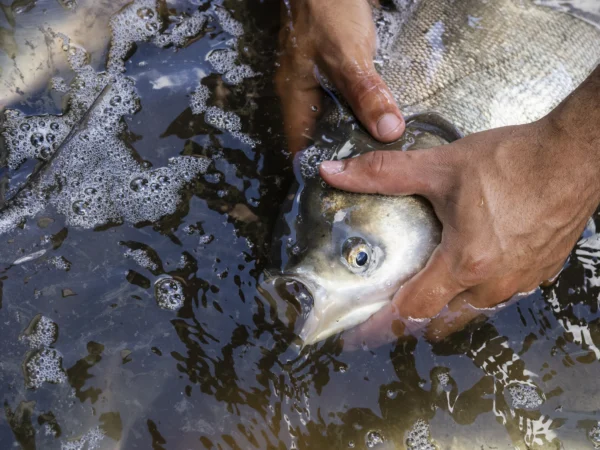
The Great Lakes are much cleaner these days than they were just a few decades ago.
Rules to get control of mercury emissions from coal-fired power plants, wastewater discharges and the burning of medical waste have led to a steady drop in mercury contamination of the waters and sediments.
Despite that progress, the levels of mercury in large game fish like lake trout has remained stubbornly high, failing to fall in line with the gradual reduction in pollution.
“When the sources of mercury are eliminated, we would expect to see levels in fish decline,” said James Hurley, who studies mercury contamination at the University of Wisconsin in Madison. “The lake sediments all show a decline in mercury loading, but we haven’t seen the concentration fall in fish.”
Hurley thinks he knows the culprit behind this mystery – the invasive zebra and quagga mussels that started taking over the lakes in the early 1990s. When the mussels showed up they set off a chain reaction in the food web that led to high mercury levels in top predators like lake trout. It’s a demonstration of just how far-reaching the disruptions caused by invasive species can be.
“The mussels have the whole food chain turned on its ear,” said Bob Wincek, president of the Milwaukee Great Lakes Sport Fishermen club.
The mussels cleared the lakes of the phytoplankton algae that form the base of the food web, which caused the zooplankton that fed on it to crash. This in turn wiped out the small fish like alewives that the trout ate, so trout were forced to look for food in deeper offshore waters or at the bottom of the lake in nearshore waters.
The fish they find there – like round goby – are both less nutritious and have higher levels of mercury.
“Since their prey don’t have as much nutritional value, the trout are slimmer and can’t dilute the mercury in their body as much,” Hurley said.

Lake Trout, Photo courtesy of James Hurley
To unpick this change, Hurley and his colleagues tested samples from an archive of trout caught in Lake Michigan between 1978 and 2012. The results were published in the Proceedings of the National Academy of Sciences. Elements like mercury, carbon and nitrogen exist in slightly different forms in nature, called isotopes. By looking at which isotopes were present in the samples, they could identify what the fish had eaten, like a fingerprint of their food. After the mussels showed up that fingerprint changed, and the researchers could see how the trouts’ diet shifted over time.
“The shift in isotope rates over time shows a change in the sources of mercury,” Hurley said. “There was a large change in the food web because of the invasive species.”
The persistently high levels of mercury in the trout mean that consumption advisories are still in place across the Great Lakes. These advisories usually state that people should not eat it more often than once a week and even less frequently for children and women of childbearing age.
According to Ed Blissick, an avid sport fisherman from Chelsea, Michigan, most anglers aren’t too concerned about mercury contamination, though he does keep a close eye on how much his teenage daughters eat on the rare occasions they have lake trout. And he is careful to trim off all of the fat, where much of the contamination is concentrated.
Both Wincek and Blissick warn that with fewer salmon being stocked in the Great Lakes, charter fishing boats are starting to target lake trout more, to give their customers a better chance to catch something. The longer-lived trout tend to have higher mercury levels than short-lived salmon, but the consumption advisories are usually not well publicised, so people may be taking home fish that are less safe to eat.
The invasive mussel population has continued to grow despite efforts to reduce their spread, making it even more important to keep a tight lid on sources of mercury, say scientists.
Michael Rennie, a freshwater ecologist at Lakehead University in Thunder Bay, said this study should be a further incentive for the Great Lakes states and provinces to strengthen emissions limits, since there is little that can be done to restore the disrupted food web.
“The mussels are here to stay, so the only control lever we have for mercury is on atmospheric deposition,” he said. “If emissions rules are relaxed, mercury will not only go back up in the lakes, it will end up even higher than it was before.”
Featured Image: Kim Altenbernt holds up his Lake Michigan lake trout catch on July 12, 2019, Photo courtesy of Ed Blissick




